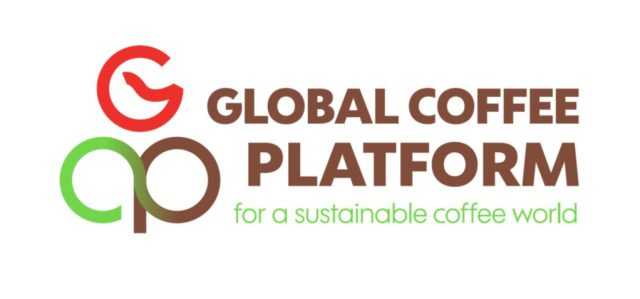BONN, Germany – Four sustainability schemes have successfully completed the recognition process and have been added to the list of schemes acknowledged by the Global Coffee Platform (GCP) as equivalent to the Coffee Sustainability Reference Code (Coffee SR Code). This recognition confirms the growing adoption of a common sustainability language, a critical step for advancing coffee sustainability.
“We’re delighted to welcome four more sustainability schemes to GCP’s growing list of companies aligning principles and practices to reach more coffee farmers with guidance on sustainability improvements and to expand market access,” said Annette Pensel, GCP Executive Director.
GCP announced the recognition of Agri Evolve’s ACE, Coocacer’s Café Sustentável, Expocacer’s ECO and Westrock Coffee Company’s RAÍZ Sustainability as equivalent to the Coffee SR Code, 2nd party assurance.
The Coffee SR Code was developed as a reference for the coffee sector to align on foundational sustainability practices and principles, covering economic, social and environmental dimensions. Sustainability schemes that successfully complete the GCP Equivalence Mechanism Process – including the four announced today – are recognized to have adopted practices and principles that are at least equivalent to the Coffee SR Code.
GCP’s Equivalence Mechanism also entails assessment against a set of operational criteria to ensure a credible and effective system for implementation. These criteria encompass governance, standard-setting, assurance, data management, and claims requirements. To ensure integrity of the process, GCP partners with the International Trade Centre (ITC), which, as GCP implementation partner and creator of the Standards Map, rigorously assessed the schemes.
“Completing the Equivalence Mechanism process is a way companies demonstrate their commitment to coffee sustainability. We applaud the efforts of these sustainability schemes, which are owned by a diverse group of GCP Members from different segments of the value chain: two Brazilian coffee growers’ cooperatives, a Ugandan social enterprise, and an US-based private label coffee roaster. Their alignment with the Coffee SR Code and the operational criteria not only supports the expansion of a common baseline of sustainability principles and practices but is also expected to further increase transparency and efficiencies over time.”
The number of sustainability schemes recognized by GCP now totals 27, with four schemes categorized as 3rd party assurance and 23 schemes categorized as 2nd party assurance. Roasters and retailers can use GCP’s recognition of equivalence to the Coffee SR Code – whether under 3rd or 2nd party assurance – as a starting point for their own due diligence.
“The adoption of GCP Tools by more companies from around the world and from different parts of the value chain is encouraging and represents the imperative shift towards sustainable practices being the necessary norm.”
The GCP Tools comprise the GCP Equivalence Mechanism, the Coffee SR Code, and GCP Collective Reporting on Sustainable Coffee Purchases. These interconnected assets were developed by GCP to provide a common language for foundational coffee sustainability practices and promote the supply and demand of coffee produced following at least baseline sustainability principles.
List of sustainability schemes recognized by GCP as Coffee SR Code equivalent
All sustainability schemes listed below are eligible for roasters and retailers to be included in the annual GCP Collective Reporting on Sustainable Coffee Purchases, another way companies are aligning and increasing transparency to advance coffee sustainability globally.
3rd party assurance:
- 4C
- Fairtrade International, Small Producer Organization and Coffee Standard
- Fair Trade USA’s Agriculture Production Standard
- Rainforest Alliance Sustainable Agriculture Standard
2nd party assurance:
- Agri Evolve’s ACE
- Comexim’s Green Trace
- Coocacer’s Café Sustentável
- Cooxupé’s Gerações
- ECOM’s SMS Verified
- Enveritas’ Enveritas Green
- Expocacer’s ECO
- Exportadora de Café Guaxupé’s Guaxupé Planet
- Louis Dreyfus Company’s Responsible Sourcing Program Advanced
- Montesanto Tavares Group’s GMT Green
- Nespresso AAA Sustainable Quality™ Program
- Neumann Kaffee Gruppe’s NKG BLOOM, and NKG Verified
- ofi’s AtSourceV, and AtSource+
- Perhusa’s ARTS
- Racafé’s CRECER
- 3E by RGC Coffee
- Sucafina’s IMPACT
- Touton’s PACT
- Volcafe’s Volcafe Verified, and Volcafe Excellence
- Westrock Coffee Company’s RAÍZ Sustainability
About
Global Coffee Platform (GCP) is a multi-stakeholder membership association dedicated to advance coffee sustainability towards the vision of a thriving, sustainable coffee sector for generations to come. GCP enables coffee producers, traders, roasters, governments and NGOs to align and multiply their efforts and investments, collectively act on local priorities and critical issues, scale local sustainability programs and grow the global market for sustainable coffee across the coffee world. United in the belief that coffee sustainability is a shared responsibility, GCP Members and GCP’s Network of Country Platforms work together to achieve transformational change on prosperity for one million coffee farmers by 2030. For more info click here.
What does it mean to be equivalent 2nd or 3rd party?
For their recognition, GCP assessed the different sustainability schemes against the principles and criteria in the Coffee Sustainability Reference Code and the operating practices that schemes should have in place to be considered credible and effective. Depending on their assurance model they are classified as GCP Coffee Sustainability Reference Code equivalent 2nd party or 3rd party assurance.
2nd Party assurance is often referred to as verification and 3rd party assurance is often referred to as certification. The main difference between these two levels of assurance is that 3rd party assurance includes the independent oversight of the competency of the entity performing the assessments/audits to ensure effectiveness and impartiality, this includes but goes beyond third-party audits at farm level.
What is the GCP Equivalence Mechanism?
The GCP Equivalence Mechanism is a framework developed by GCP to assess whether a scheme can be considered equivalent to the Coffee Sustainability Reference Code (Coffee SR Code), a sector-wide reference on the foundations of sustainability in economic, social and environmental dimensions for green coffee production and primary processing worldwide. GCP’s Equivalence Process evaluates whether a sustainability scheme meets both the code and a set of operational criteria (including governance, standard-setting, assurance, data and claims requirements). This helps to ensure that recognized sustainability schemes have a credible and effective system for implementation.
What is the Coffee Sustainability Reference Code (Coffee SR Code)?
The Coffee SR Code provides sustainability stakeholders with a simplified and fit-for-purpose framework to foster better understanding of principles that support baseline sustainable coffee production. In addition, it addresses ongoing challenges in the coffee sustainability landscape as well as key emerging concerns such as climate change, or diversity, equity and inclusion.
The Code provides the sector with a common language to collectively advance farmers’ prosperity, social well-being, and the conservation of nature. It is available in Bahasa, English, French, Portuguese, Spanish, and Vietnamese.














